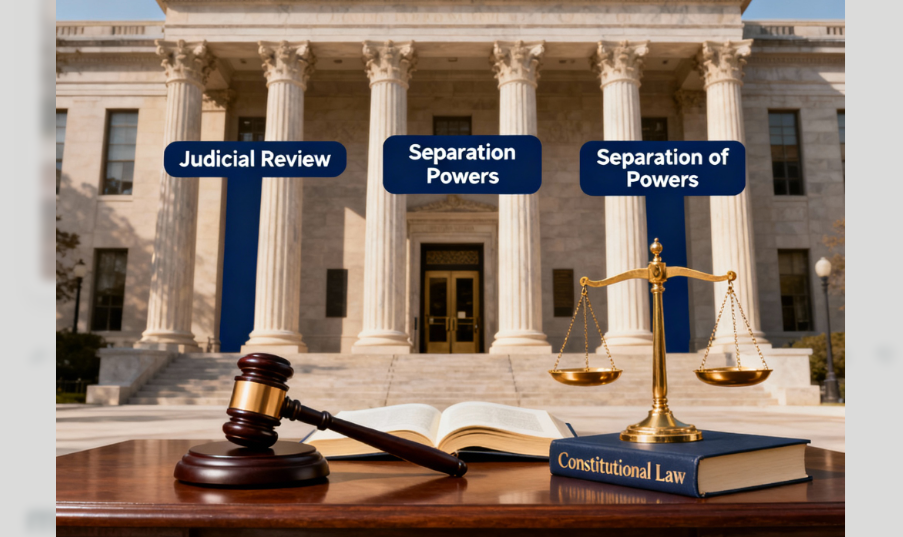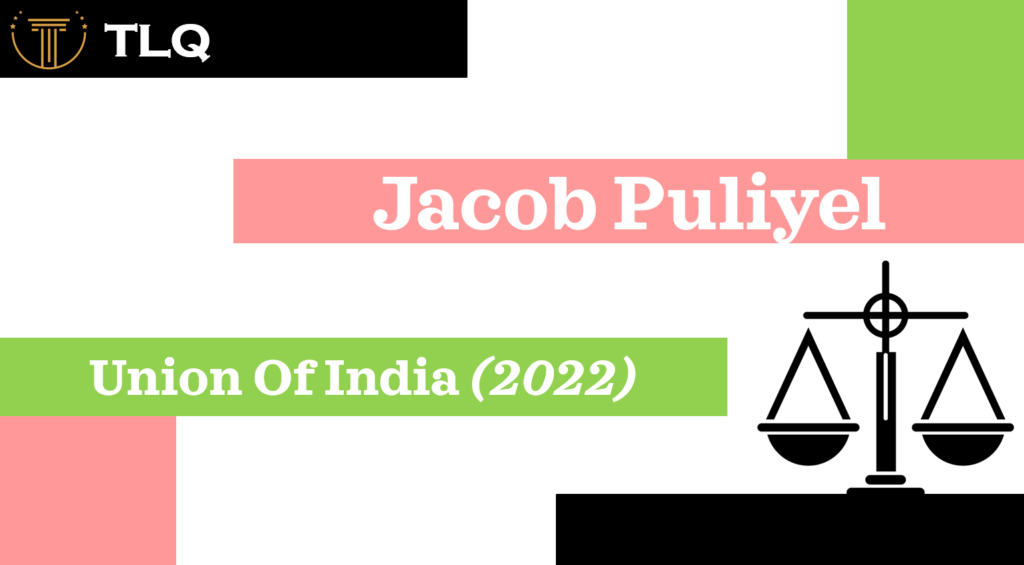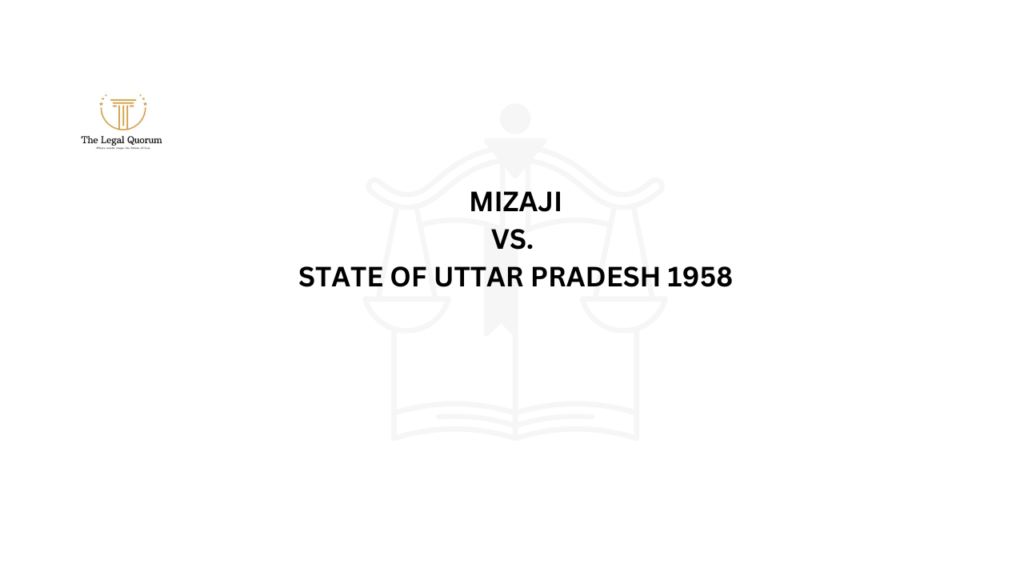Published on: 25th November 2025
Authored by: Abhinav Dwivedi
The West Bengal National University of Juridical Sciences
Court: Supreme Court of the United States.
Bench: Robert (C.J), Ginsburg, Breyer, Sotomayor, Kagan, Kennedy, Thomas, Alito, and Gorsuch, JJ.
Date of Judgment: June 22, 2018.
Relevant Provision: 4th Amendment of the U.S Constitution, Stored Communications Act (SCA), 18 U.S.C. § 2703(d), Hobbs Act, 18 U.S.C. § 1951, Firearms Statute, 18 U.S.C. § 924(c).
Fact of the Case
RadioShack and T-Mobile stores in Michigan and Ohio were the targets of a string of violent thefts by armed robbers between December 2010 and March 2011. The robberies had a similar pattern: a number of masked guys seized cash and new cellphones from the businesses, forced staff and customers to the back rooms, and flashed weapons.
First Look and Crucial Witness
Following the arrest of Timothy Sanders, a suspect in the robberies, federal law enforcement started looking into the crimes. Sanders admitted to being one of the leaders to his ory Carpenter. Sanders said that Carpenter chosen the target stores, provided guns, organised the robberies, and gave instructions to those involved in committing the crimes.
Cell-Site Location Information (CSLI) Request
Prosecutors requested Carpenter’s cell phone location records to back up Sanders’ claims and locate him near the robbery scenes. The government used the Stored Communications Act (SCA), 18 U.S.C. § 2703(d), to obtain telecommunications records based on “specific and articulable facts” relevant to an ongoing investigation, rather than a probable cause warrant under the Fourth Amendment. This is a lower standard than probable cause.
Pursuant to the SCA orders, the FBI got Carpenter’s historical cell-site location information (CSLI) from his wireless carriers, MetroPCS and Sprint. The data spanned 127 days and contained 12,898 time-stamped records indicating which cell towers handled Carpenter’s calls and texts. This allowed police to retrace Carpenter’s activities over a four-month period and locate his phone near at least four of the accused robberies.
Trial Proceedings
At trial, the government presented the CSLI records, which showed Carpenter’s phone near the robbery locations at relevant times, along with testimony from accomplices, including Sanders, and phone call records demonstrating communication between co-conspirators immediately before and after the robberies.
Carpenter’s defence lawyer sought to suppress the CSLI evidence, claiming that collecting it without a probable cause warrant violated the Fourth Amendment’s limitation on unreasonable searches and seizures. The District Court dismissed the application, concluding that the defendant had no legitimate expectation of privacy in records exchanged willingly with a third party (cellular service providers).
Carpenter was convicted by a jury for numerous counts of robbery under the Hobbs Act (18 U.S.C. § 1951)[1] and weapons offences under 18 U.S.C. § 924(c)[2]. Carpenter was sentenced to more than 100 years in jail due to required consecutive sentences linked with firearms crimes.
Appeal and Supreme Court Review[3]
On appeal, the United States Court of Appeals for the Sixth Circuit upheld the conviction, ruling that Carpenter had no reasonable expectation of privacy in the CSLI because it was business information owned by wireless carriers under the third-party doctrine established in Smith v. Maryland and United States v. Miller.
Carpenter petitioned for certiorari to the United States Supreme Court, which granted review to determine whether the government’s unauthorised collection of historical CSLI records from a wireless carrier constitutes a “search” under the Fourth Amendment, necessitating a warrant supported by probable cause.
Issue before the Hon’ble Supreme Court
- Whether the government’s acquisition of historical cell-site location information (CSLI) constitutes a “search” under the Fourth Amendment[4]?
- Whether such acquisition requires a warrant supported by probable cause?
Contention of the Petitioner: Timothy Ivory Carpenter
- Violation of Fourth Amendment Rights.
argued that obtaining historical cell-site location information (CSLI) from wireless providers without a probable cause warrant constituted a “search” under the Fourth Amendment. It was emphasised that CSLI provides extensive and intimate information about a person’s travels over time, resulting in “near perfect surveillance” capacity.It was claimed that persons have a legitimate expectation of privacy in their physical movements and location data, even when they are kept by third parties.
- Limitations of the Third Party Doctrine[5]
Separated CSLI from standard third-party records (such as bank documents in United States v. Miller or phone numbers dialled in Smith v. Maryland).It was argued that CSLI is generated automatically and not willingly transmitted; therefore, consumers do not knowingly consent to tracking just by using a cell phone. Asserted that the digital age necessitates a different interpretation of the Fourth Amendment because persons cannot rationally avoid generating such data. - Scope of SCA[6]
It was argued that the Stored Communications Act was insufficient to meet Fourth Amendment requirements since it allowed access based on a low “specific and articulable facts” standard rather than probable cause.
Contention of the Respondent: United States Government
- No Fourth Amendment “search”
Carpenter had no reasonable expectation of privacy in CSLI because it was voluntarily shared with third-party service providers (wireless carriers).The third-party concept from Smith v. Maryland (phone numbers dialled) and United States v. Miller (banking records) was used to argue that documents kept by a firm are not protected by the Fourth Amendment[7]. - Business Records Concept[8]
Asserted that CSLI is the property of cellular carriers, not Carpenter, and thus qualifies as regular business records for the company. Contended that collecting these documents through a court order (in accordance with the Stored Communications Act) is legal and has long been acknowledged in investigative techniques. - Law enforcement is necessary
It was emphasised that CSLI evidence is critical for investigating and prosecuting crimes, particularly serious crimes such as armed robbery. Warned that seeking warrants for such records would place an extra burden on law enforcement and impede quick investigations. - Scope of relief sought
It was suggested that, even if there are strong privacy interests, the Court should follow a restricted approach to avoid weakening established subpoena and records-access procedures.
Observation made by the Hon’ble Supreme Court
Majority Opinion (Roberts, C.J., joined by Ginsburg, Breyer, Sotomayor, Kagan)
- Reasonable expectation of privacy in CSLI.
Cell-site location information (CSLI) gives an intimate and detailed record of a person’s bodily movements. Individuals have a reasonable expectation of privacy in all of their physical movements, even if that information is stored by third parties (cell service providers). - Distinct from Traditional Business Records
CSLI differs from telephone records (Smith v. Maryland) and bank records (United States v. Miller). Unlike dialling phone numbers or engaging in voluntary banking transactions, CSLI is generated automatically by just using a cell phone, with no user activity required. - Limits on the Third-Party Doctrine
The Court ruled that the third-party concept does not extend to the qualitatively different category of cell-site location information. Citizens do not forfeit their constitutional protection just because they use technology that is necessary for modern living. - Digital Age Sensitivity[9]
Long-term CSLI collecting is similar to installing an “ankle monitor” on each phone user, allowing for near-perfect surveillance. This kind of monitoring raises privacy concerns that go beyond standard law enforcement approaches. - Narrow Decision Scope
The Court emphasised the limited character of its ruling.
It only pertains to historical CSLI, not real-time CSLI or tower dumps.
2. Does not impact exigent circumstances exceptions, which allow for instant warrantless searches. - Constitutional Adaptation to Technology
Riley v. California recognised special privacy concerns with smartphones, and CSLI requires similar constitutional protection. The Fourth Amendment must be construed with awareness towards technological innovations and their implications on privacy. - Warrant requirement
Before accessing CSLI, the government must first get a warrant based on probable cause. The lower criterion of the Stored Communications Act (“specific and articulable facts”) is insufficient.
Dissenting Opinion:
Justice Kennedy (joined by Thomas & Alito)
- CSLI for Business Records
CSLI was regarded as typical business documents maintained by wireless carriers, comparable to bank records in Miller and telephone call records in Smith. Customers voluntarily provide this data when they utilise cell phone services. - The Third-Party Doctrine fully applies.
It was emphasised that a lengthy precedent permitted the government to get third-party records without a warrant. The majority’s decision to narrow this theory upended accepted investigative methods. - Practical Considerations for Law Enforcement
Warned that the judgement impedes legitimate investigations and casts doubt on law enforcement’s capacity to gather important evidence.
Justice Thomas (separate dissent)
- The Property-Based Approach[10]
Objected to the Katz “reasonable expectation of privacy” standard. Carpenter had no ownership stake in CSLI, so no Fourth Amendment protection applied, and questioned the legitimacy of extending privacy rights to data that persons did not own or control.
Justice Alito (joined by Thomas)
- Search vs. Subpoena Distinctions
It was emphasised that getting business records through a subpoena is not the same as performing a physical search. The majority conflated established subpoena procedures and Fourth Amendment searches. This verdict may destabilise standard law enforcement mechanisms for collecting documents.
Justice Gorsuch (separate dissent)
- Scepticism of the Third Party Doctrine
expressed scepticism regarding the soundness of the third-party doctrine. Individuals may have property or contractual rights over their data, which could support Fourth Amendment protection. However, Carpenter did not articulate a property-rights argument, thus Gorsuch voted to affirm[11].
Judgment
In a 5-4 ruling, the US Supreme Court ruled that the government’s acquisition of historical cell-site location information (CSLI) from wireless carriers constitutes a Fourth Amendment search. As an outcome, the government must normally seek a warrant based on probable cause before accessing such records. The decision of the United States Court of Appeals for the Sixth Circuit was reversed, and the matter was remanded for further proceedings consistent with the Court’s ruling.
Impact of the Judgment worldwide[12]
- Global Recognition of Digital Privacy
The decision established a strong precedent that location data and digital communications metadata are subject to constitutional-level privacy protections.
Carpenter has been mentioned or referred to by courts and legislatures in various nations as they consider the privacy concerns of telecommunication records and mass monitoring. - Influence on International Jurisprudence
Europe (EU, UK): The rationale in Carpenter is consistent with the General Data Protection Regulation (GDPR)[13], which already provides strong protection for personal data, including location monitoring. When deciding on metadata retention and mass surveillance, European Union courts (such as the Court of Justice of the EU) have taken into account comparable privacy grounds. Carpenter has been used in UK debates about the Investigatory Powers Act 2016 as evidence of tougher privacy requirements in democratic democracies[14].
Canada[15]: Canadian courts had previously recognised significant privacy concerns in telecom subscriber data (R. v. Spencer, 2014), but Carpenter enhanced reasons for warrants when accessing digital location data.
Australia and New Zealand: Data retention systems under anti-terrorism laws have been judicially scrutinised, with Carpenter mentioned in scholarly and legal arguments to limit warrantless access to location records.
Policy Reform for Technology and Law Enforcement: Several countries have begun to review their telecoms metadata surveillance legislation, requiring tougher warrants.
Law enforcement organisations around the world have placed a greater focus on court scrutiny before acquiring sensitive mobile location details.
Human Rights and Digital Age Debate: The ruling was consistent with Article 17 of the International Covenant on Civil and Political Rights (ICCPR)[16], which safeguards privacy rights, reflecting an emerging international consensus that digital privacy is a fundamental human right. Carpenter is used by digital rights advocacy groups such as the Electronic Frontier Foundation and Privacy International to argue for stricter data protection and judicial monitoring in cross-border data access issues.
Impact on tech Industry: Carpenter’s case has had an indirect impact on Apple, Google, and Facebook policies regarding law enforcement data requests, as technology companies and mobile service providers worldwide now demand warrants or higher legal standards when resisting overly broad government requests for location data[17].
Conclusion
The decision in Carpenter v. United States is a watershed moment in constitutional privacy law, demonstrating how courts must adapt traditional legal concepts to the reality of the digital era. By requiring a warrant to get historical cell-site location information (CSLI), the Court narrowed the long-standing third-party doctrine while also acknowledging that individuals have a genuine expectation of privacy in data created automatically by modern technologies. This judgment has an impact outside the United States, affecting debates and legislative reforms in many countries such as the European Union, Canada, Australia, and Latin America, where courts and legislatures have increasingly questioned government access to location records. Carpenter is acknowledged as a compelling authority in several of these regions for stricter privacy safeguards and more judicial monitoring of surveillance activities. The ruling also strengthens global human rights frameworks, such as Article 17 of the International Covenant on Civil and Political Rights (ICCPR) and Article 8 of the European Convention on Human Rights (ECHR)[18], by acknowledging that location tracking reveals deeply personal details about a person’s life, However, the Court limited its decision to historical CSLI and left other monitoring technologies for future consideration. Carpenter highlights a fundamental principle: constitutional protections must adapt to restore human liberty as technology advances. As digital data becomes an unavoidable aspect of human activity Carpenter stands out as a historic decision that ensures fundamental rights are protected even in an era of widespread digital surveillance.
[1] 18 U.S.C. § 1951
[2] 18 U.S.C. § 924(c)
[3] United States v. Carpenter, 819 F.3d 880 (6th Cir. 2016)
[4] U.S. Const. amend. IV
[5] Smith v. Maryland, 442 U.S. 735 (1979)
[6] 18 U.S.C. § 2703(d)
[7] U.S. Const. amend. IV
[8] United States v. Miller, 425 U.S. 435 (1976)
[9] Riley v. California, 573 U.S. 373 (2014)
[10] Katz v. United States, 389 U.S. 347 (1967)
[11] Orin S. Kerr, Third-Party Doctrine
[12] Electronic Frontier Foundation, Carpenter v. United States, https://www.eff.org/cases/carpenter (last visited July 29, 2025).
[13] GDPR, Regulation (EU) 2016/679
[14] Investigatory Powers Act 2016 (UK)
[15] R. v. Spencer, [2014] 2 S.C.R. 212 (Can.)
[16] ICCPR, art. 17
[17] Privacy International, Legal Frameworks on Government Access to Data, https://privacyinternational.org (last visited July 29, 2025).
[18] ECHR, art. 8




